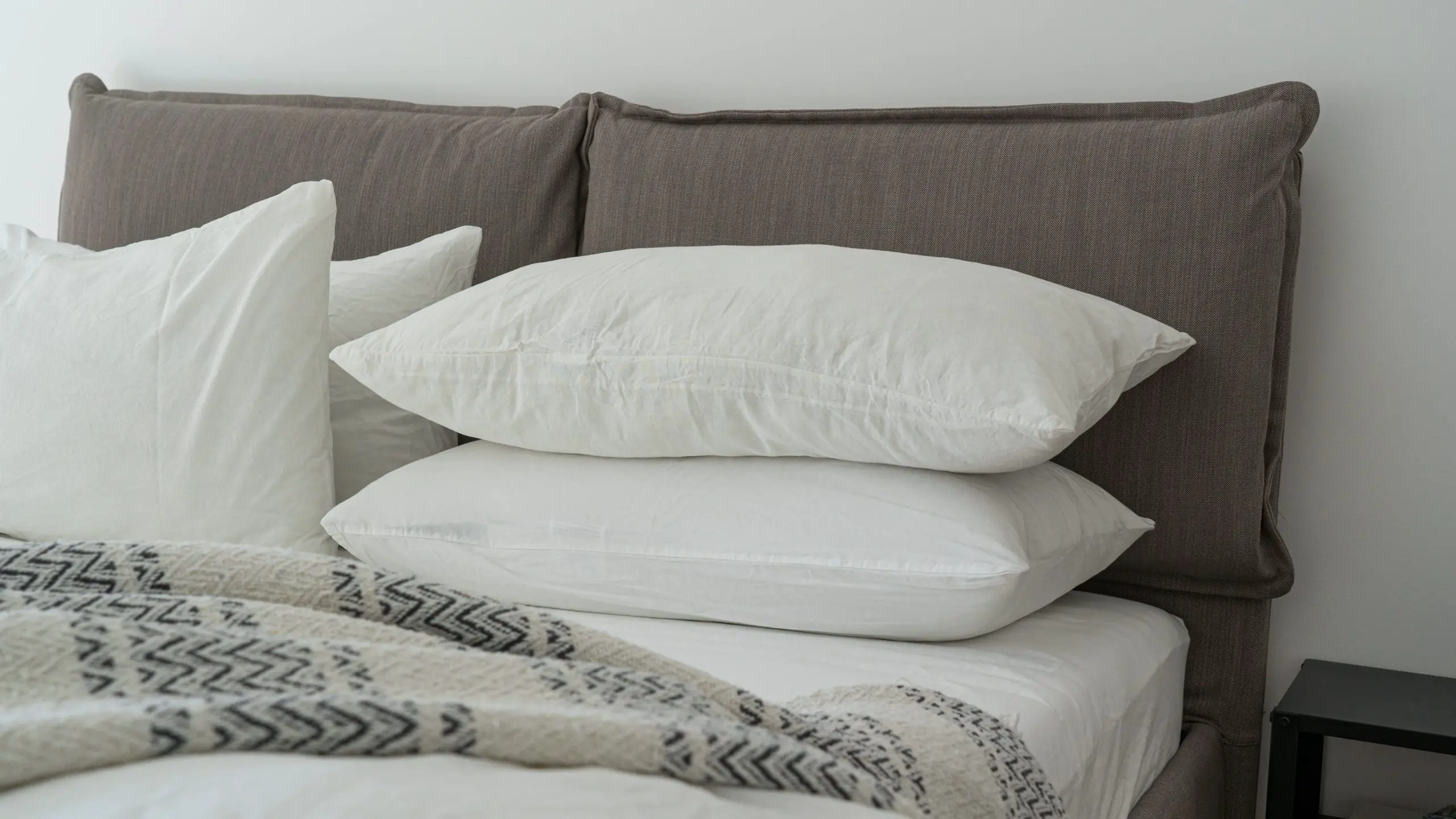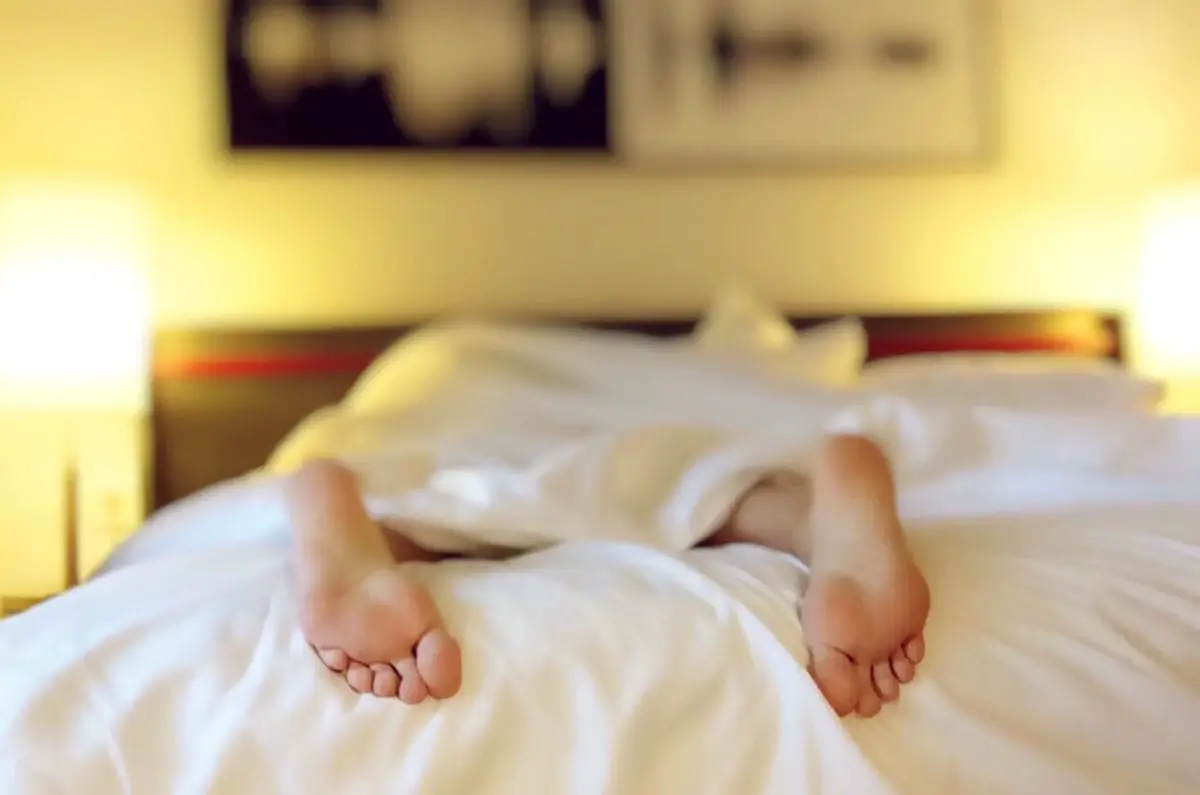We have lots of ways to talk about sleep in English. These sleeping idioms can describe falling asleep, being asleep, and waking up again. Some don’t even have anything to do with sleep!
Take a look at this list of idioms about sleep, which includes definitions and example sentences to help you understand how to use them. It’s good to try and learn these so that you recognise them in future. Idioms can’t be taken literally, so it’s difficult to guess the meaning from the words alone.

Idioms about going to sleep and waking up
Fall asleep
To fall asleep simply means to begin sleeping.
“The kids fell asleep easily after a long day playing.”
Fall asleep may also be used to talk about someone dying. We have a separate article containing idioms about death if you want to learn more about these kinds of phrases.
Tuck someone in
When you tuck someone in to bed, you make sure they are comfortable and get them ready to sleep. This may or may not involve actually tucking in the bedding around them.
“Grandpa, will you tuck me in tonight?”
Generally the person performing this action is in some sort of caring role, whether it’s a parent tucking in their child or a carer tucking in an elderly, infirm person. You might use the phrase in other situations as a joke:
“My husband has a cold so I’ve tucked him into bed and given him a hot water bottle.”
Sleep tight
After you tuck someone in, you might tell them to sleep tight. This is just a way of wishing them a good sleep. You could also say sleep well.
A longer version is: Good night, sleep tight, don’t let the bedbugs bite! This one is usually only said to children. Check out some more examples of idioms for kids that will make learning English fun.
Hit the sack
The sleeping idiom hit the sack means to go to bed.
“I have to be up early tomorrow, I think it’s time to hit the sack.”
A variant of this, most often used in American English, is hit the hay. Both of these refer to simple beds made out of hay or a sack.
Turn in (for the night)
To turn in also means to go to bed, or at least to begin getting ready for bed.
“It’s late; I think I’d better turn in for the night.”
A similar nighttime saying is call it a night.
Up at the crack of dawn
This is not actually an idiom about sleep, but about waking up. If you’re up at the crack of dawn, you wake up very early. Dawn is the time of day when light first appears in the sky.
“I’ve been up since the crack of dawn cleaning the house, ready for my mother-in-law to visit.”
Have a lie-in
In contrast, a lie-in is an extended sleep where you stay in bed for longer than you usually would.
“I’m looking forward to having a lie-in tomorrow morning.”
We can also use the phrasal verbs lie in and sleep in, although we wouldn’t say ‘have a sleep-in’.
“We can sleep in until 10am tomorrow, but then we need to get ready for the wedding.”
Confused about when to use lay or lie? We have a separate article to explain the difference.
Get up on the wrong side of the bed
When someone is in a particularly grumpy, irritable or unhappy mood, we might say they got up on the wrong side of the bed.
“What’s wrong with you today? Did you get up on the wrong side of the bed?”
“Sorry for shouting at you earlier, I must have got up on the wrong side of the bed.”
This doesn’t mean literally that there is a right and wrong side of the bed to get out of. However, the saying does originate from Roman times when superstitions taught that it was unlucky to get out of bed on the left side, or to put your left foot on the floor first.
Not sleep a wink
Now that you know that a ‘wink’ can refer to sleep, you might be able to work out that to not sleep a wink means to not sleep at all.
“I didn’t sleep a wink last night, I couldn’t stop thinking about this presentation I have to give at work today.”
“Don’t let the kids have ice cream right before bedtime; they won’t sleep a wink!”
Note that this idiom can’t be used in an affirmative statement, so we wouldn’t say ‘I slept a wink’.
Pull an all-nighter
Another idiom about not sleeping: this one applies if you are studying or working so hard that you keep going all through the night and don’t have time to sleep.
“I had to pull an all-nighter to get my essay finished on time.”
If you want to know some better approaches to studying, check out these idioms about learning.

More sleeping idioms
Sleep like a baby / log / rock
Although some parents may disagree with the meaning of this idiom, to sleep like a baby means to have a deep and restful sleep.
“I’m going to sleep like a baby tonight after such a hard day.”
We might also say sleep like a log or a rock.
“Steve sleeps like a rock. Once his head hits the pillow, nothing can wake him.”
A clean conscience makes a soft pillow
You can read about ‘a clean conscience’ and other clean idioms in our separate list. But when used in this proverb about sleeping, it means that people who do good and don’t have anything to feel guilty about will sleep well.
“I’m glad I told the truth about what happened. After all, a clean conscience makes a soft pillow.”
Out like a light
Similarly, out like a light means in a very deep sleep. It also suggests that the person fell asleep very quickly.
“Taylor was out like a light last night.”
A similar sleep idiom is out cold. This also features on our list of cold idioms.
Fast asleep / Sound asleep
If you are fast asleep or sound asleep, you are sleeping very deeply. You won’t be easily woken.
“The baby is fast asleep; let’s not wake him just yet.”
Forty winks
Forty winks refers to a nap (a short sleep in the daytime). It is usually preceded by the verb have, grab or get.
“I need to grab forty winks before we get ready for the dinner party tonight.”
You might also hear people saying twenty winks, which is another sleep idiom that means exactly the same thing.
Some people have a short sleep like this to help them relax or feel calm.
Cat nap
Another idiom for a short sleep is a cat nap. Although it doesn’t last long, you usually feel rested afterwards.
“It looks like Grandma is having a quick cat nap.”
You can find more idioms featuring animals here.
Toss and turn
As a sleep idiom, to toss and turn in bed means to have a light, restless sleep. However, it can also be used more literally to refer to someone continually repositioning themselves in bed to find a more comfortable position.
“Lisa tossed and turned all night after hearing her friend’s bad news.”
Light sleeper
Someone who tosses and turns a lot may be described as a light sleeper. It means that they can be easily woken and may not feel very well rested after their sleep.
“I’m such a light sleeper! Even the smallest noise outside disturbs me.”
The opposite would be described as a heavy sleeper or a deep sleeper.
Beauty sleep
Getting enough sleep is important if you want to look fresh and radiant in the morning. With this in mind, you might talk about getting your beauty sleep – it’s quite a common expression about beauty.
“I need to get an early night tonight. Can’t miss my beauty sleep before the big day tomorrow.”
Sleep on something
If you have a difficult decision to make, you might decide to sleep on it. This means you give yourself time to think about it overnight, rather than deciding immediately.
“I really can’t decide which car to buy. Let me sleep on it and I’ll give you a call in the morning.”
Lose sleep over something
When something causes you to lose sleep, it is making you worry a lot – to the point where you can’t sleep properly because you keep thinking about it.
“I have been losing sleep over organizing this event. I’ll be glad when it’s over.”
“I know it’s stressful but there’s no need to lose sleep over it.”
You can find more idioms about stress and worry here.
Let sleeping dogs lie
This is one of the sleep idioms on this list that doesn’t really relate to sleep at all. To let sleeping dogs lie means to leave a situation alone so as to avoid making it any worse.
“Aunt Leslie still owes me money, but I think it’s best to let sleeping dogs lie for now.”
It’s surprising how many dog idioms we have in English!
Be able to do something in your sleep
If you can do something in your sleep, it means you can do it effortlessly and without really thinking about it.
“Patty has been working at the company for 14 years; she could sew garments in her sleep!”
So, that’s it for this list of sleeping idioms. Hopefully you didn’t fall asleep while reading them!
If you can think of any idioms about sleep, please leave a comment below to share them.



Hi, sleep tight, don’t let the bedbugs bite.
The origin of this I learned in a small house in Chatham Massachusetts about 20 years ago. This house is also a museum. Sleep tight refers to a rope bed. The ropes must be tightened frequently. Don’t let the bedbugs bite, refers to a sort of mattress made from corn stalks that had bugs in them in the old days. Fascinating stuff.
Another expression, my favorite, is two sheets to the wind, like I was last night when my girlfriend called. My phone was right beside me and I never heard anything because I was two sheets to the wind, fast asleep. I don’t know the origin of this wonderful expression.
Fascinating insight about tightening the rope beds, thank you Bruce! And ‘two sheets to the wind’ might be better on our drinking idioms list 😉
I always thought “two sheets to the wind” meant “drunk.” Just my 2 cents.
PS. The house in Chatham, Massachusetts is called the Atwood museum. Well worth calling to verify my explanation or go there to see for yourself.
Zoom in on Google Maps and go to Street View and see the old Chatham Lighthouse light beside the parking lot in an enclosure.